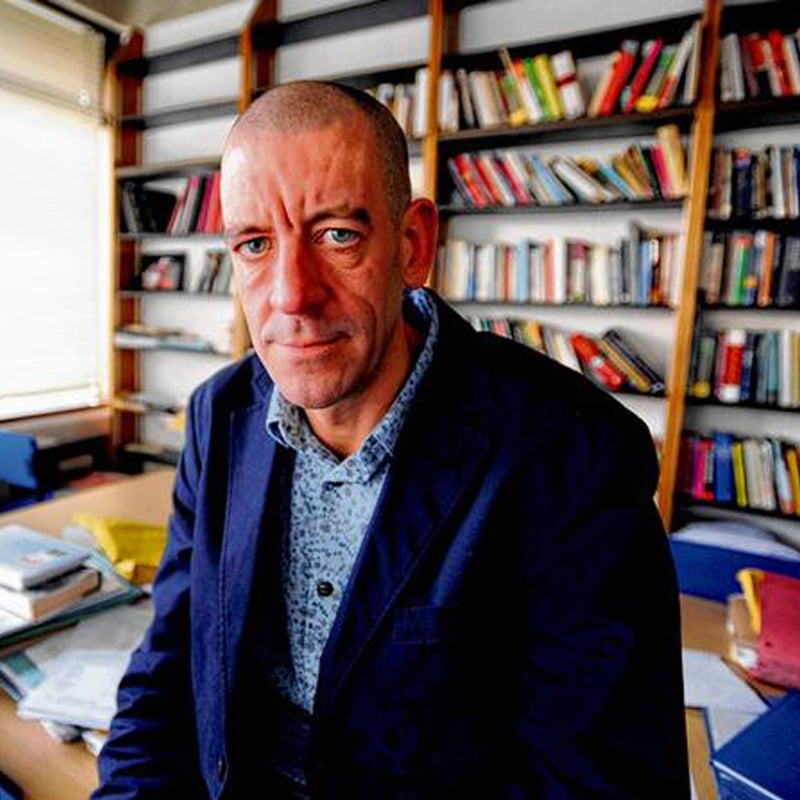
#16
Making sense of Brexit and the extraordinary times we live in
Diarmaid Ferriter
As Professor of Modern History in UCD, Diarmaid Ferriter is one of Ireland’s best-known historians. Diarmaid is also a regular broadcaster on television and radio and a weekly columnist with the Irish Times. In 2010 he presented a three-part history of twentieth century Ireland, ‘The Limits of Liberty’, on RTE television. A colossus of Irish academia, Diarmaid has written over twelve books on Irish history. His books include The Transformation of Ireland 1900-2000, in 2007, Ferriter wrote the critically acclaimed biography, Judging Dev, which won in three categories of the 2008 Irish Book Awards. His most recent book, The Border, was published this year.
With Brexit, the backstop and the fate of the border uncertain, we are living in an extraordinary period. In a global context we also facing some of the most contentious political issues of our time with Trump, climate change and the move to right wing politics.
Enjoy this wide ranging conversation with the renowned Irish historian on Brexit, the performance of politicians such as Boris Johnson, the EU and the Irish Government over the past few years, to technology, and the challenges faced with the movement from the written word, Ireland and it’s performance on climate and women’s issues, the GAA and its role in society today, and much more.
Subscribe
Find the show on your favourite player
Summary
2:45 Lessons learned from history
- Examples of leaders not learning from past mistakes
- Europe’s cyclical tendencies towards extremism
- The particular circumstances of the 1930s
- The rise of nativism
- How Trump echoes the rhetoric of the 19th century
- Continuity in how opportunists take advantage of big economic or cultural shifts
- The one constant factor: power
6:40 Historians and government
- Why historians sometimes stay away from contemporary issues
- Historians’ roles as government advisors
- Upcoming difficult historical commemorations
- How to remember and commemorate civil wars
- Problems behind historians who become politicians, such as David Thornley or Conor Cruise O’Brien
12:28 Brexit in a historical context
- How Brexit has dug up old issues
- Brexit as the consequence of an awkward relationship with Europe
- Putting the border in its historical context
- The consequences of Boris Johnson’s ignorance of the importance of the border
- What inspired Diarmaid to write “The Border”
- The effects of growing up with the border
- The south’s perception of the north and vice-versa
- The 2 minority issues in Ireland caused by the border
- The absurd physical manifestations of the border
20:05 Westminster
- How it has reasserted its power
- Westminster’s history and tradition
- Its effort to regain its reputation
- The opposition’s less than optimal position
- What Diarmaid learned in the Westminster archives
21:25 Ireland’s voting system
- The origins of Ireland’s unique system of proportional representation
- Fianna Fáil’s attempt at changing the voting system
- Coalition governments
- The confidence and supply model
24:30 The Tory party
- Old-school or “one-nation” tories
- What Diarmaid learned from John Major
- The power that can be exercised by unelected advisors such as Dominic Cummings
- Criticisms of Dominic’s approach
28:30 Advisors
- The rise of unelected advisors: “It’s gone too far”
- How conflict was handled by the 1973-77 Fine Gael and Labour coalition
- Why outsourcing solutions is problematic
33:50 “Fake news” and social media
- Why history should be a core school subject
- The importance of engagement and mediation
- The advantages and disadvantages of modern communication and access to information
36:55 Education
- The decline in skills like reading, writing and communicating
- Why Diarmaid often writes in longhand
39:30 Brexit’s current deal
- Worrisome loyalist discourse
- Ireland’s withdrawal agreement
- Martin McGuinness and Arlene Foster’s joint letter outlining Northern Ireland’s unique position
- Other unanswered questions: citizenship, devolution, power-sharing, DUP
- The Good Friday agreement
- Scotland’s take on Brexit
45:57 Scottish independence
- The option of Celtic confederation
- Gordon Brown’s influence
- Why some believe that Scotland shouldn’t follow Ireland’s lead
- EU sentiment in Scotland
50:15 DUP power and influence
- Edward Carson as iconic unionist leader
- Questioning the strategy of unionists historically
- Unionism as primarily a defensive strategy
- The needs of different constituents such as the business community and farmers
- The problem with having a religious fundamentalist base
- The different wings of the DUP
- The DUP during Theresa May’s leadership
55:20 Dissidents
- Lyra McKee’s death
- Historic tensions in Derry
- How dissidents use political vacuums to their advantage
- Clare Dwyer Hogg‘s film “Hard Border” and its portrayal of how people live with the border today
- Fear and caution in the face of potential changes
59:40 Brexit & Winston Churchill’s legacy
- Britain’s surprise when faced with EU solidarity
- Boris Johnson’s interest in Winston Churchill
- Britain’s global commitments in Churchill’s era
- The romanticization of Churchill in “Darkest Hour”
- Éamon de Valera’s relationship with Churchill
1:07:45 Personalities
- How de Valera, Seán Lemass, and Jack Lynch’s personalities helped or hindered them
1:10:40 The environment
- Ireland’s failure to address climate change
- Why it should take a much bigger place in school and politics
1:13:18 The Green Party
- How local results vary from general election results
- The election of Roger Garland, the Green Party’s first TD
- Predictions for the future and impact of the party
1:15:30 GAA
- Why the GAA is important
- Croke Park’s history
- The evolution of girls’ and women’s presence in sports
1:19:45 Irish women
- How women’s lives have changed since the ’60s
- The rise of women’s testimonies
- Feminism throughout history
1:24:20 Rapid-fire questions
- The historical figure Diarmaid would most like to meet
- His favourite book
- The most important book on Irish history